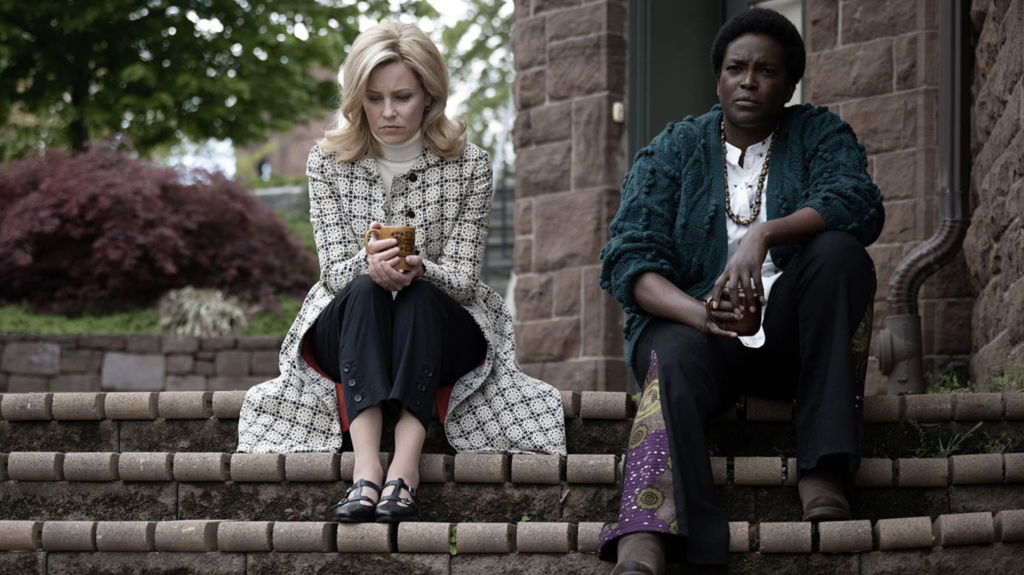
Call Jane
2022
2h 1 m
Directed by Phyllis Nagy
Review by Deb Singh
Call Jane is a statement film that takes us back to an era where one way to end an unwanted pregnancy was to throw yourself down a set of stairs. In fact, there’s a scene in the film where the heroine, Joy, contemplates exactly that.
In 1968 Chicago, a married mother of a budding teenager locates the audience to the life of Joy (Elizabeth Banks) and her normative, white, straight, middle-class family. The film begins with Joy’s experience of needing to access an abortion. Joy is pregnant and falls ill, becoming diagnosed with a life-threatening condition if she carries her pregnancy to term.
Deciding to seek an abortion, Joy and her husband face a panel of men on the hospital board. These men get to decide Joy’s fate, between her health and her pregnancy. In this scene, we see the board members speak as if Joy is not in the room, and her bodily autonomy and choice to have an abortion are silenced. At one point in the scene, Joy even mutters, “I’m right here,” emphasizing her invisibility.
The hospital denies Joy the right to an abortion, knowing full-well it’s a major health risk. She is forced to seek an illegal abortion, but when she arrives at the underground establishment, Joy gets freaked out and bolts. While in the dilapidated neighbourhood, she comes across a poster with the words “Pregnant? Get Help. Call Jane.” And here lies the next phase of the film, taking us into the world of women creating their own access to safe abortions—a story based on a real network of activists who called themselves “Jane” or “The Jane Collective.”
The initial scenes of the film are a haunting reminder of the women and gender diverse people in the U.S. who had to deal with unwanted pregnancies on their own, prior to Roe v. Wade in 1973.
After Joy gets an abortion at the underground syndicate, Call Jane, she gets more involved there, befriending Gwen (Wunmi Mosaku). Through Gwen, we get a slice of the feminist movement around abortion rights, who’s involved, and why. Scenes with Call Jane organizers’ meetings offer us a window into why abortion should be our right, no matter our circumstance or identity.
This leads us to Call Jane’s leader, Virginia (Sigourney Weaver), whose experiences of sexism and white privilege are seen throughout the film. In one scene, Virginia is asked to trade sexual favours with the abortion doctor to renegotiate the deal in order to get two free abortions per week. This precedes a scene where there is debate on who gets access to abortions (that is, people who can pay), most often leaving Black people, racialized people, and young people without access.
With the 2022 overturning of Roe v. Wade, Call Jane becomes even more relevant today. Abortion is no longer a constitutional right in the U.S. and each state decides whether to provide access. Thirteen states have already banned abortion, meaning there is less access to the procedure today than in the 1980s.
Near the end of the film, Joy begins to learn to perform abortions herself. Call Jane eventually dismisses the doctor, who turns out to be a fake, and starts to safely perform the procedures themselves, with not one person having complications from it. In its innovative and revolutionary way, the activists of Call Jane suggest that society doesn’t require the patriarchal western medical model to govern and perform abortions, but that it’s possible to learn to do this safely ourselves. As a portal into women’s history, Call Jane can be a road map with solutions to the problems anti-abortionists leave us with today.
Deb Singh is a Toronto- born writer and activist working in the non-profit sector. Starting with poetry at 11, Singh has written everything from blogs to speeches and manifestos. Embarking on fiction, her heart’s desire is to write stor- ies that centralize revolutionary love and other politically-charged topics through creative prose.

